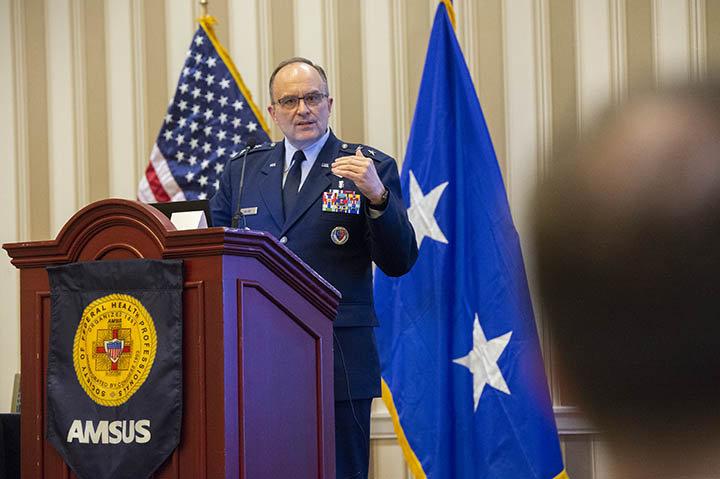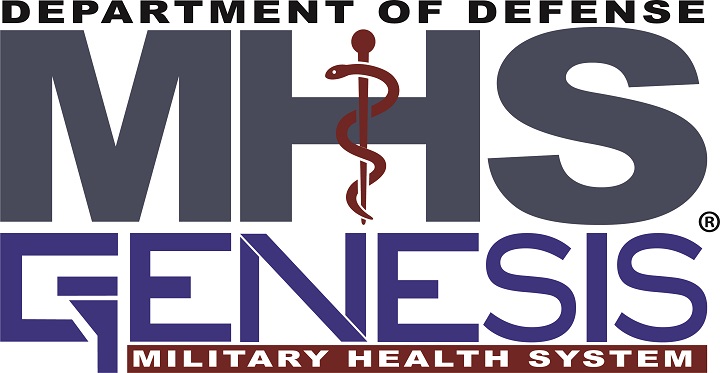
‘Good things are happening’ as DoD continues to roll out MHS GENESIS

Air Force Maj. Gen. Lee Payne discusses MHS GENESIS at the 2018 AMSUS annual meeting. (Photo by MHS Communications)
Adopting a new electronic health record, also known as an EHR, across a large, geographically diverse enterprise is no easy task. To meet the change management needs for this critical effort, the Defense Health Agency has established the Office of the Chief Health Informatics Officer. OCHIO will collaborate with a community of health care clinicians, health information technology experts, and testers to help users of this health information management system seamlessly transition to new technologies and processes.
MHS GENESIS is the single, integrated medical and dental EHR. Scheduled to be systematically fielded at all military hospitals and clinics by 2024, initial testing phases of MHS GENESIS are now complete. The Military Health System is addressing challenges and issues as it prepares for the first wave of deployment next fall, said Air Force Maj. Gen. Lee E. Payne, who is dual-hatted as the Defense Health Agency Assistant Director for Combat Support and MHS EHR Functional Champion.
“I have to set the stage for the frontline users about what they can expect and that’s part of my responsibility,” said Payne. “We’ve been building the capability of the Office of Chief Health Informatics Officer to help us manage the record more in real time and deal with these problems, [and] help build the content configuration necessary to improve the record.”
As the MHS EHR Functional Champion, Payne represents the voice of front-line users and will make critical decisions throughout its deployment. His responsibilities include ensuring solutions are seen from an enterprise perspective and evaluating potential process enhancements. He also serves as the DHA liaison to the Program Executive Office, Defense Healthcare Management Systems, which is responsible for the deployment of MHS GENESIS and management of the rollout plan.
“I want to give you a transparent review of where we are with MHS GENESIS,” said Payne, speaking at the annual meeting of the Society of Federal Health Professionals, better known as AMSUS, in November. “There are some good things happening and I want to be able to share these with you.”
MHS GENESIS launched at four initial operational capability sites in 2017: Fairchild Air Force Base, Naval Health Clinic Oak Harbor, Naval Hospital Bremerton, and Madigan Army Medical Center. Payne said lessons learned from the Pacific Northwest deployment focused on change management, workflows, issue resolution, and training methods.
“We had a change management strategy,” said Payne, adding that they underestimated the magnitude of the change. “I think in some of our minds, at least in my mind, it was, ‘OK, we’ll buy the commercial, off-the-shelf system, you just plug it in, you go to work and you do your job after you get training.’ The system comes about 80-percent configured already, but the MHS is continuing to refine workflows for the new system.
Another critical component of the rollout strategy is helping users understand their workflows, Payne said. “If you try to take your existing business processes, whether that’s in AHLTA or Essentris, and you try to jam that into the new electronic health record, you will fail,” said Payne, referring to legacy EHR systems. “You must adapt your business practices to the new record.”
Payne said MHS GENESIS is more than a system for documenting health care, as AHLTA does. It serves as a care coordination tool and provides standardized workflows that aren’t available in the current systems, a feature that has exposed inconsistencies across the MHS, he said. “Not only do we have variability between the services, but we have variability between our hospitals, and we have variability inside our hospitals and clinics,” said Payne. Communicating workflows and bridging knowledge gaps from old to new processes early in the transition was another important lesson, he continued. “We have to make decisions from an enterprise perspective, not from a local perspective.”
The MHS is also focusing on improving its training approach and content so it ties more closely to workflows. This will include retraining users at the initial sites when training methods change, he said. Peer expert training, where physicians and nurses get trained by experts in their specialty, has been the most effective method.
“We want to get those peer experts trained and experienced with the record, so as we go live, there’s somebody at your elbow to be able to coach you through that process,” said Payne. Having one peer expert per 10 physicians has shown to be a good ratio, he said, a ratio he aims to require for wave-one sites. These include Naval Air Station Lemoore, Travis Air Force Base, and Army Medical Health Clinic Presidio of Monterey, all in California, as well as Mountain Home Air Force Base in southwestern Idaho.
Payne said that as challenges at the IOC sites became evident, OCHIO prioritized the issues and incidents, addressing more than one-third of cases (tickets) so far. The functional community continues to discuss how to better measure and communicate findings with the field, and checks in with end users for feedback once the issues are resolved, he assured.
“Feedback and tickets are helping us improve the system and improve the usability,” said Payne. “It’s really focused on the end users and how they use the system, so it’s great information for us. It’s a roadmap for us to get better.” It also has the potential to be helpful for the Department of Veterans Affairs as it moves forward with its EHR modernization effort utilizing the same record as DoD.
Payne said MHS GENESIS breaks down barriers to care, not only between the services and throughout the stages of a patient’s life, but also between Departments, fostering a collaborative culture that supports an integrated system of health and readiness.
Payne praised the testers at IOC sites for their great work during the initial phase of deployment, thanking them for making MHS GENESIS even better.
“We want to do as much as we can possibly do prior to wave one to make it go much smoother,” said Payne. “It’s kind of a cycle of continuous process improvement. We’re learning and we’re going to learn things from wave one that we didn’t learn from the IOC sites. We are improving the system and I think we’re going to get some momentum as we move forward. Our goal is to make wave one wildly successful. We want it to be a home run.”
DHA IPM 18-021: Guidance for Immediate Completion and Closure of Open Encounters and Records in Legacy Systems
Policy
This Defense Health Agency-Interim Procedures Memorandum (DHA-IPM), based on the authority of References (a) through (c), and in accordance with the guidance of References (d) and (e): • Establishes the Defense Health Agency’s (DHA) procedures to complete and close open encounters within the legacy systems in preparation for the implementation of Military Health System (MHS) GENESIS. • Identifies and delineates responsibilities associated with completing and closing open encounters within the legacy systems in preparation for the implementation of MHS GENESIS. • Should be used by DoD military treatment facilities (MTFs) to update procedures and workflows that pertain to the DoD Health Record Management, Patient Administration, and other MTF functions impacted by these decisions. • Is effective immediately; it must be incorporated into a DHA-Procedural Instruction. This DHA-IPM will expire effective 12 months from the date of issue.
- Identification #: 18-021
- Date: 11/26/2018
- Type: DHA Interim Procedures Memorandum
- Topics: Military Health System Electronic Health Record | MHS GENESIS
Defense Health Agency officials recognize Naval Hospital Bremerton's efforts
Article
11/26/2018

NHB is one of the four sites in the Pacific Northwest to deploy MHS GENESIS in 2017
MHS GENESIS Fact Sheet
Fact Sheet
11/1/2018
This fact sheet describes the DoD’s electronic health record, MHS GENESIS.
MHS GENESIS Patient Portal Fact Sheet
Fact Sheet
11/1/2018
This fact sheet describes the MHS GENESIS Patient Portal.
MHS GENESIS Patient Portal Brochure
Publication
7/27/2018
This brochure provides details about the MHS GENESIS patient portal and its key benefits.
Desktop to Datacenter initiative explained at DHITS 2018
Photo
7/26/2018

Mark Goodge, chief technology officer for the Defense Health Agency, speaks to attendees of the Defense Health Information Technology Symposium about the agency Desktop to Datacenter initiative.
MHS GENESIS: Continuing to make progress
Article
7/25/2018

Senior Military Health System leaders met at the Defense Health Information Technology Symposium in Orlando, Florida, to discuss progress with MHS GENESIS
DHA Director and PEO DHMS answer questions at DHITS 2018
Photo
7/25/2018

Vice Adm. Raquel C. Bono, director of the Defense Health Agency, and Ms. Stacy Cummings, Program Executive Officer for Defense Health Management Systems, answer questions about the progress of MHS GENESIS electronic Health record during the 2018 Defense Health Information Technology Symposium July 24 in Orlando, Florida.
Program Executive Office, Defense Healthcare Management Systems Fact Sheet
Fact Sheet
7/19/2018
This fact sheet provides an overview of the Program Executive Office, Defense Healthcare Management Systems (PEO DHMS) -- an acquisition organization that oversees three program management offices.
MHS Genesis
Photo
7/3/2018

Official Image of MHS Genesis
Navy clinic first MHS GENESIS site to complete accreditation
Article
7/3/2018

Navy clinic first MHS GENESIS site to complete accreditation
MHS GENESIS focal point for Defense Health Agency Director visit at Naval Hospital Bremerton
Article
7/3/2018

The trip included candid conversations regarding implementation, best practices, lessons learned, issues and improvements.
Fresh from HIMSS: Building a single tech platform will modernize MHS joint readiness
Article
3/8/2018

Defense leaders share military health IT advancement plans, standards, and activities
Defense Healthcare Management Systems Fiscal Year 2017 Annual Report
Report
2/12/2018
The Program Executive Office, Defense Healthcare Management Systems (PEO DHMS) was chartered to transform the delivery of healthcare and advance data sharing through a modernized electronic health record (EHR) for service members, Veterans, and their families.This Annual Report, "Connecting Technology and Health," highlights our many accomplishments ...
Year in Review: Innovations aid warfighters, families
Article
12/26/2017

MHS explores world-class solutions for beneficiaries





















.png)









No hay comentarios:
Publicar un comentario